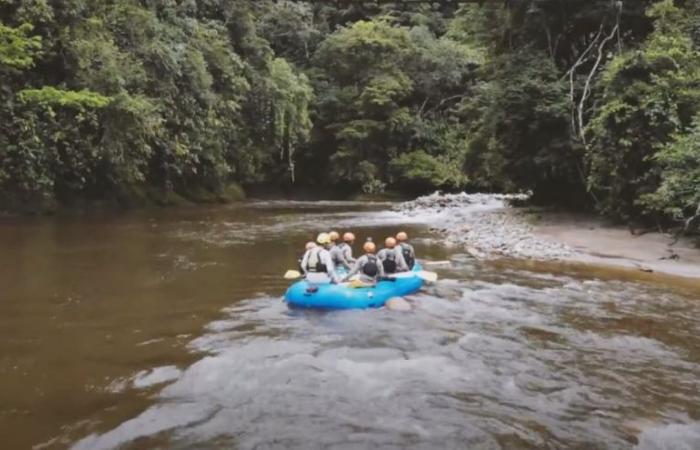Neither total nor partial. The desire for peace is fading for the inhabitants of Miravalle, until now one of the most hopeful spaces for the reintegration of ex-combatants in Colombia, now caught in the crossfire of the dissidents of the extinct FARC guerrilla group that persist in violence. Threats from a faction of the self-proclaimed Central General Staff have ended up displacing this week the signatories of the peace agreement who exchanged rifles for oars. Despite the unanimous condemnation of this harassment, the decision has been made.
“We are forced to leave the territory, the reintegration space, our home,” the former guerrillas and peasants who, under the motto “rowing for peace,” were trained as rafting guides in that jungle area lamented in a statement on Thursday. and mountainous area of the department of Caquetá, where Costa Rican instructors once arrived. “We have been left in the middle of an absurd dispute between the guerrillas of the Central General Staff (EMC) and the Second Marquetalia to the point of suffocation, suffocating the possibilities of continuing our tourist and sports operations in our area.” Although they recognize that it is a painful moment, they promise that they will not give up and intend to protect what they have cultivated.
Miravalle, in the symbolic municipality of San Vicente del Caguán, had become a postcard of the transformative potential represented by the peace agreement signed at the end of 2016. Crowned by a long street of colorful houses on the edge of a steep mountain, it was one of the 24 territorial training and reintegration spaces, or ETCR in the institutional jargon derived from the agreement. There, despite all the obstacles, they created, among others, a rafting company that offered descents down the rapids of the Pato River. They had the support of the UN Verification Mission and the Ríos Tropicales company of Costa Rica, a pacifist country known for the sustainable development of ecotourism. In this way they managed to attract more than 3,000 visitors and the rafting team even represented Colombia at the world championships in Australia, in 2019, and Italy, in 2023.
But Miravalle’s venture and its inspiring example of reconciliation crashed in recent days with the intensified violence of dissidents who departed from the 2016 agreements. More than 80 people will leave the ETCR, including more than 20 children, and the space will be practically empty. The Iván Díaz front, one of the structures of the now divided EMC, accused the signatories of being accomplices of the Second Marquetalia, the other great umbrella of dissidents, issued them an ultimatum and declared the place a “conflict zone.” Its purpose, observers agree, is to clear strategic corridors of illegal economies to exercise territorial control in the midst of the war to the death waged by different factions.
The Colombian State has been unable to guarantee the security and life of former combatants in the almost 8 years since the signing of the peace agreement. More than 400 have been murdered, with dissidents primarily responsible. Miravalle is the fifth ETCR in which dissidents have caused a massive displacement of signatories, with the aggravating factor that both the Iván Díaz front – headed by alias Calarca– such as the Second Marquetalia, are negotiating with the Government of Gustavo Petro within the framework of the total peace policy, with which they are simultaneously in dialogue with various armed groups. That, however, has not prevented threats to former guerrillas and communities.
The verification mechanism of the table with the EMC has sent a special international commission to Miravalle “to contain these pressure actions,” said Camilo González Posso, the Government’s chief negotiator, who has described it as something “inadmissible.” in the midst of the barrage of reactions. The authorities installed a ‘Unified Command Post for Life’ this Friday and the Minister of Defense himself, Iván Velásquez, acknowledged that it is a fact of “extreme seriousness,” while the representative of the UN Secretary General in Colombia, Carlos Ruiz Massieu called for respect for the life and reincorporation of the signatories. “A genuine desire for peace involves respecting those who have already opted for the path of peace and reconciliation,” he emphasized.
Newsletter
The analysis of current events and the best stories from Colombia, every week in your mailbox
RECEIVE THE
The messages rejecting the threats have multiplied. Former president and Nobel Peace Prize winner Juan Manuel Santos considered what is happening in Miravalle “totally unacceptable,” since the Government “has the obligation to implement the security guarantees established in the peace agreement, recover control of the territory, and protect the life of the signatories and of the communities committed to building peace.” Rodrigo Londoño, Timochenko, the other signatory of the agreements as head of the former Revolutionary Armed Forces of Colombia, went even further in his objections to Petro, who has had the support of Comunes, the guerrilla’s heir party. “I am convinced of total peace and a negotiated solution to the persistent violence in the country. But improvisation, concessions to executioners and meanness to implement the peace agreement are a risk for the lives of thousands of signatories,” he said in a message addressed to the president himself. “Those responsible, president, are the dissident groups to which you granted political recognition and opened a place for them at a negotiating table.”
Subscribe here to the EL PAÍS newsletter on Colombia and here to the channel on WhatsAppand receive all the information keys on current events in the country.


